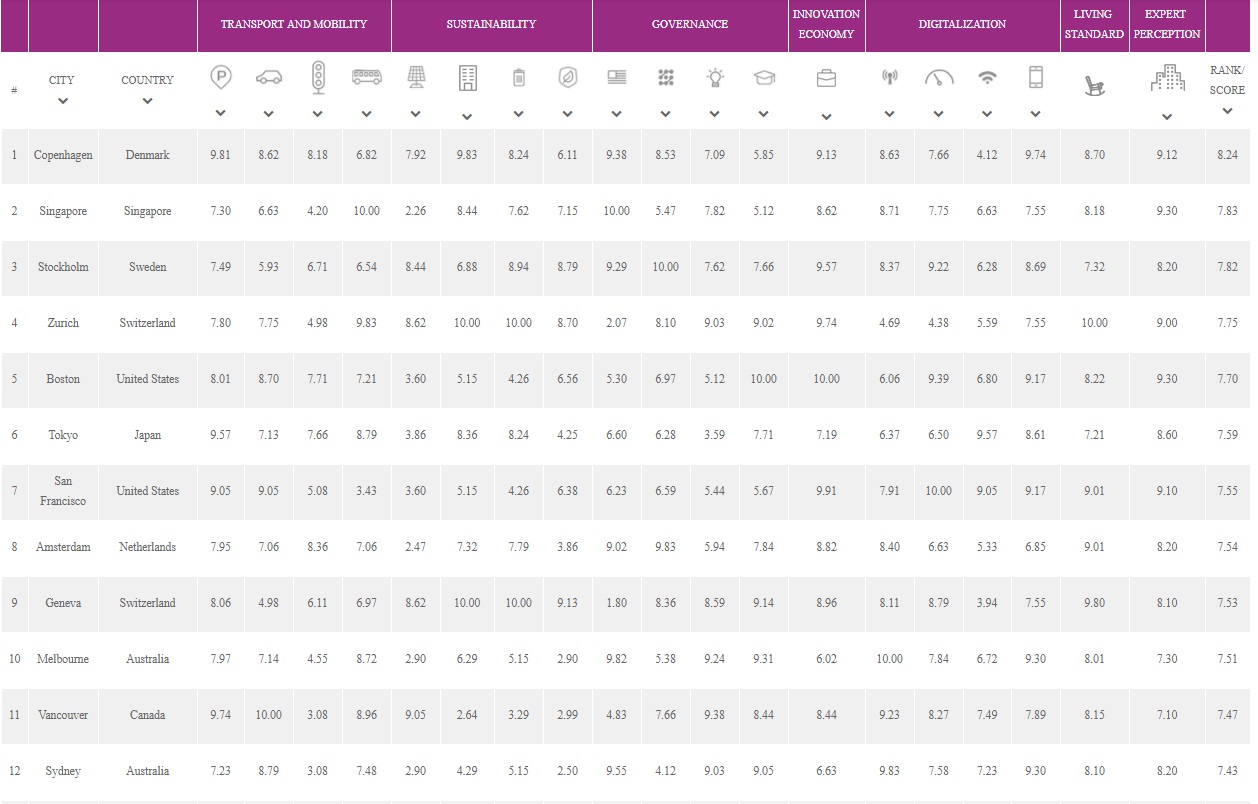Melbourne has beaten out Sydney as Australia’s smartest city.
Sydney came in 12th to Melbourne’s 10th position.
Despite their impressive rankings, their high degree of digitalisation masks serious shortcomings in other categories that reflect chronic struggles to boost areas such as innovation.
The Easy Park Group’s newly-announced Smart Cities Index (SCI) ranked 100 cities worldwide based on 19 factors including: transport and mobility; sustainability; governance; their innovation economy; digitalisation, including internet speeds and mobile phone penetration; living standards; and expert perception of the city.
Copenhagen, Denmark was rated as the world’s smartest city ahead of known innovation hubs like Boston (ranked 5th), Tokyo (6th) and San Francisco (7th).
Perth rated 41st, and Adelaide was 61st. Brisbane didn’t even rate.

EasyPark's Top 12 smartest cities. Source: EasyPark
EasyPark, which promotes the development of traffic-management and smart-parking initiatives, facilitates initiatives such as phone-based payment for parking. Melbourne ranked 7.97 out of 10 for its smart parking, while Sydney trailed at 7.23, Perth scored 5.99, and Adelaide rated just 2.99.
Individual scores varied considerably within each city’s ranking. For example, while Melbourne scored a 10 in 4G wireless coverage, its traffic scored a 4.55 – higher even than Sydney’s traffic score of 3.08.
Sydney and Melbourne scored poorly in terms of clean energy – with each scoring just 2.9 out of 10 – but ranked quite high in measures like citizen participation (9.82 and 9.55, respectively), urban planning (9.24 and 9.03), and education (9.31 and 9.05).
Internet speeds were good but far from the head of the pack, scoring 7.84 and 7.58 respectively (San Francisco scored a perfect 10), while both cities’ high smartphone penetration (9.30) helped lift their overall scores even though expert perception of their progress in becoming a smarter city (7.30 and 8.20, respectively) lagged the other members of the top 10.
Smart-city consultant Paul Budde was sceptical of the rankings, noting that “hodgepodge” activities often skewed the results based on individual projects. “One year they’re scoring high in one area,” he told Information Age, “and in another year they are scoring high in another.”
Large and well-funded cities like Sydney and Melbourne were often pursuing smart-city agendas in fits and starts that played well in global rankings, he said, but smaller cities like Adelaide, Canberra, Newcastle, and Ipswich had more comprehensive smart-city stories to tell.
“Often in big cities you see that there is not a coherent approach to innovation,” he said. “You have start-ups and innovation centres, but that doesn’t mean they all work together on innovation. A truly innovative city has to be far more collaborative between business, the city council itself, and academia. And it’s only when you start seeing that sort of development happening, that you can really start talking about smart city innovation.”
The SCI rankings reflected this shortcoming, with conspicuously low scores for the business ecosystem in Melbourne (6.02) and Sydney (6.63). These scores, which judged the cities’ ‘information economy’, were the lowest out of the top 25 cities and well behind cities like Singapore (8.62), Amsterdam (8.82), London (9.05), Zurich (9.74) and Boston (10.00). Perth scored just 3.86 in that category, while Adelaide scored 2.90.
Australian cities’ consistently low innovation scores reflect the relative nascence of efforts to improve the fostering of innovation through commercial investment, start-up funding, private-public partnerships, tax breaks, and more.
Despite explicit promotion of a more aggressive innovation agenda in a recently released Innovation and Science Australia (ISA) white paper, The ratings reflect difficulties finding traction for innovation efforts despite growing SME investment in innovation, recognition of the strong payback from innovation investments, and the push for a federal innovation agency to complement the government’s controversial $1.1bn National Innovation and Science Agenda (NISA).










